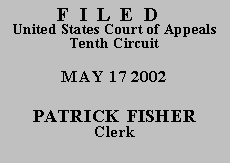

| ROBERT HOPKINS, |
|
| v. | |
| MIKE ADDISON, Warden; BARBARA LOUIS, Medical Director a/k/a Barbara Lewis; G. JOHNSON, Doctor for J.E.H.C.C., | |
| JIM E. HAMILTON, Correctional
Center; and K.G. LOWE, Doctor,
Defendants. |
In March 2001, the defendants moved "to dismiss this action under authority of Fed. R. Civ. P. 12(b)(6)" and alternatively sought "summary judgment against [Hopkins] pursuant to Fed. R. Civ. P. 56(b)." Defs.' Mot. to Dismiss/Mot. for Summ. J. & Br. in Supp. at 1, R. Vol. I., Doc. 18. On July 3, 2001, the district court dismissed Hopkins' complaint, finding that Hopkins failed to exhaust his administrative remedies as required by 42 U.S.C. § 1997e, and that he "failed to give an explanation or [even] address defendants' arguments that he failed to exhaust his administrative remedies." Order at 2, R. Vol. I, Doc. 23.
Hopkins appealed pro se, conceding his failure to exhaust but arguing that the exhaustion requirement did not apply because his complaint sought monetary damages not administratively available. Appellant/Petitioner's Opening Br. at 3-4. Upon our initial review of his appeal, we took notice of the fact that Hopkins was released on parole after the suit was originally filed, and appointed counsel for Hopkins to file a supplemental brief on his behalf addressing two issues: (i) whether the exhaustion requirement under section 1997e continues to apply when the plaintiff is a prisoner at the time the action is brought but is released from prison during the course of litigation; and (ii) whether, applying liberal rules of construction, the court can view Hopkins' pro se brief as having raised that issue. Order, No. 01-7110 (10th Cir. Dec. 13, 2001). Applying de novo review, we affirm.
DISCUSSION
42 U.S.C. § 1997e(a) mandates that "[n]o action shall be brought with respect to prison conditions under section 1983 . . . by a prisoner confined in any . . . prison . . . until such administrative remedies as are available are exhausted." Under this section, exhaustion of administrative remedies is a prerequisite to suits brought by prisoners under 42 U.S.C. § 1983, and the Supreme Court has held that the exhaustion requirements of section 1997e apply to suits seeking monetary damages that are not administratively available. Booth v. Churner, 532 U.S. 731, 741 (2001). Accordingly, Hopkins' suit is not exempt from the requirements of section 1997e.
As for the continued applicability of section 1997e to an inmate released on parole after he or she already filed an action in violation of the exhaustion requirements of section 1997e, it is clear that Hopkins' pro se brief, even construed liberally, does not raise the issue. Moreover, we find no authority directly supporting the notion that an inmate's release on parole excuses his or her non-compliance with the statute while still incarcerated, and we hold that there is no exemption under the circumstances presented here.
CONCLUSION
Because this court appointed counsel and directed briefing on some of the issues identified above, Hopkins' motion for leave to proceed without payment of costs or fees is GRANTED. The district court's judgment of dismissal is AFFIRMED.
ENTERED FOR THE COURT
Stephen H. Anderson
Circuit Judge
*.This order and judgment is not binding precedent, except under the doctrines of law of the case, res judicata, and collateral estoppel. The court generally disfavors the citation of orders and judgments; nevertheless, an order and judgment may be cited under the terms and conditions of 10th Cir. R. 36.3.